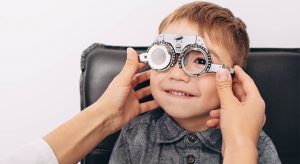Visual health is crucial for all aspects of life— seeing, learning, and enjoying life to the fullest.
Many parents share similar concerns about their child’s vision. Some of the most common worries include:
- Is their vision developing normally?
- How well can they see?
- Will the sun ruin their eyes?
- What should I do if my child has something stuck in his eye?
- Will watching TV ruin his eyes?
If you can relate to any of these concerns or have concerns of your own, read on to find out the top 8 ways to protect your child’s vision.
Follow these tips to protect your child’s eyes and developing vision, to give them a life-time of successful achievements.
If you suspect your child has an eye condition, contact an eye doctor near you who can diagnose and treat the condition.
Schedule regular eye exams
Eye doctors recommend bringing your child for an eye exam from as early as six months of age. During an infant eye exam, the eye doctor will begin to track the baby’s vision development, enabling early detection of any ocular or vision anomalies. If a problem is detected, early treatment can help to stop the progression of any disorder, and ensure the most optimal results.
As your child grows older, it is important to keep up with their eye exams— they are due for a second exam when they turn three years old, and a third exam before they begin grade school. After these predetermined times, eye doctors recommend an annual exam for all children.
Keeping up with your child’s eye exams will enable your eye doctor to follow your child’s visual development at every stage, and be there for you if there are any changes along the way.
Know your family history
Many ocular conditions are passed down through the gene pool. If anyone in your family has been diagnosed with an ocular condition or vision disorder, your child is at a higher risk of developing them as well.
It is important to discuss your family history with your child’s eye doctor and keep up with their regular eye exams, or as directed by your doctor. This will ensure that any conditions that may arise will be detected and effectively managed before the condition progresses.
SEE RELATED: Protecting Your Child From Digital Eye Strain
Encourage healthy eating habits
Healthy vision development is influenced by the foods our children consume. While most children will do anything for a “special treat” that usually consists of candy, it is important to offer these treats in moderation, and really save them for those times that they are well deserved.
Additionally, in this fast paced world we live in, many parents don’t have time to cook gourmet dinners every night, and may rely on packaged foods, hot dogs, pizza, and lunch meat to satisfy their children’s bellies. While these meals may taste good, and provide a simple solution to a quick and easy dinner, they don’t contain the vitamins and nutrients that our children truly need to keep their bodies, including their eyes, healthy.
Try to incorporate as many fruits and vegetables (yes, even broccoli and cauliflower) into your child’s diet. Fruits and vegetables contain many different vitamins and minerals necessary to maintain healthy eyes and vision.
Your child may resist at first, but will soon grow to enjoy these healthy foods if they become a staple in his diet. If your child continues to refuse certain fruits or vegetables, don’t give up. You can always blend them into a soup or smoothie, or even add them to your child’s favorite pasta sauce.
Keep in mind, your child is watching you and will most of the time imitate your behavior— so set a good example and be sure to include healthy foods on your plate as well.
Spend time outdoors
Spending at least an hour outside every day is vital to your child’s health, and can even lower their risk of ocular conditions, such as myopia. Playing outdoors, or even just taking a walk, will help the muscles in their eyes to relax.
Children spend many hours of their day participating in near vision activities such as reading, using a digital device, building puzzles, and even just playing with toys. In order to see these objects clearly, our eyes must converge, and our focusing muscles are put to work.
When these near vision activities are performed for an extended period of time, the muscles in our eyes can become fatigued— just like any other muscle in the body would. For example, when you carry heavy groceries from your car into your house, many bags later, your arm muscles may need to rest.
To help the eye muscles relax, eye doctors recommend going outdoors, as this encourages us to look at objects and images in the distance.
So take your child for a walk or encourage them to play in the sunshine.
Wear sunglasses outdoors
Wearing sunglasses will protect your child’s eyes from the sun’s harmful ultraviolet (UV) rays. Excessive exposure to UV radiation over time, has been linked to serious ocular diseases later in life.
When purchasing a new pair of shades for your child, be sure to find lenses that contain 100% UV protection. Sunglasses for children are now available in a variety of shapes, sizes, and colors— and even include frames with wrap around temples to secure the frame to their face, so they don’t fall off during play.
Keep chemicals and sharp objects out of reach
Household cleaning supplies and detergents contain harmful chemicals that pose a great danger to your littles one’s health. If chemicals or toxins get splashed into your child’s eye, they can even threaten loss of vision.
Also, be sure to keep any kitchen or office supplies— anything unclean, sharp, or pointy, out of arm’s reach, and high enough that your child won’t be able to stand on a stool to grab hold of the shiny object they so desire.
Wear protective eyewear for sports
Safety or protective eyewear for sports games and activities is essential for protection against serious eye injuries.
Eye injuries account for over 1.5 million visits to the emergency room in the United States.
Therefore, to protect your child’s eyes and vision, encourage them to wear special protective eyewear during all sports activities— you may even want to show them how many professional sports players fashion protective eyewear to protect their eyes as well.
Limit screen time
In this day and age, the amount of time children spend on computers, tablets, smartphones, and watching TV, has stirred up concern among eyecare professionals.
Prolonged screen time can be harmful for your child’s eyes, causing blurry vision, focusing problems, and may even increase their risk for developing myopia.
Limiting screen time each day, and ensuring that your child takes frequent breaks while using any type of digital device, will help to protect your child’s vision. Taking frequent breaks is also important when participating in any other kind of near-vision activity, such as reading, writing, or drawing.
Protecting your child’s eyes will decrease their risk of developing serious eye conditions that can threaten their vision.
When following this guide, keep in mind that setting a good example for your child is a critical part of a successful plan. Therefore, take the time to incorporate these tips into your life, to care for your own ocular health as well…your child will be watching you.
LEARN MORE: Guide to Children’s Eye Exams
Schedule an appointment with an eye doctor for a comprehensive eye exam, and to discuss any questions you may have about treating your child’s eye condition.










